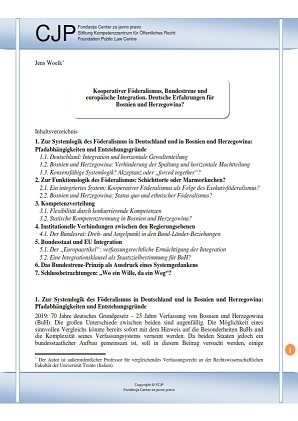Kooperativer Föderalismus, Bundestreue und europäische Integration. Deutsche Erfahrungen für Bosnien und Herzegowina?
Cooperative Federalism, Bundestreue (Federal Comity) and European Integration. Experiences from the German Federal System for Bosnia and Herzegovina?
Author(s): Jens Woelk
Subject(s): Constitutional Law, Government/Political systems, EU-Approach / EU-Accession / EU-Development
Published by: Fondacija Centar za javno pravo
Keywords: Bosnia and Herzegovina; constitution; federalism; European integrations; EU; cooperative federalism;
Summary/Abstract: 70 years German Basic Law – nearly 25 years Constitution of Bosnia and Herzegovina (BiH). The huge differences between both Constitutions, their application and their respective environment are evident suggesting not to even start a comparison, in particular due to the complexity and the peculiar situation of BiH. However, as both States are federal systems, the paper tries to highlight some structural elements of the German federal experience using them as a basis for reflections regarding the improvement of the current stalemate in BiH. The focus is on the different logic of German federalism, as a system which is based upon cooperation due to the asymmetrical set up in the functions of federal level and States. After a brief introduction on the origins and the historical environment conditioning the federal system, some structural elements making up the specific form of German cooperative federalism are illustrated: the systemic logic, an overview over the competencies and the institutional link, the Federal Council. The unwritten constitutional principle which guarantees cooperation and respect even in the absence of written rules in order to guarantee a functional and functioning system is discussed before focusing on the adaptation of the federal system to European integration and multi-level governance. After the presentation and brief illustration of each element of the German federal system, comparative reflections follow regarding the situation in BiH. While the German experiences are certainly not transferable to BiH as such, they clearly demonstrate that federalism will be a solution only, if there is a political will to make it work and to use it positively for making the system function as a system. Despite federalism being a structural principle for nearly 25 years in BiH, too, it has rather been a problem than the solution. The political will for overcoming the cold war after the conflict through cooperation and by improving the Dayton compromise has to come from within.
Series: Fondacija Centar za javno pravo - Projekti
- Page Count: 21
- Publication Year: 2019
- Language: German
- Content File-PDF

